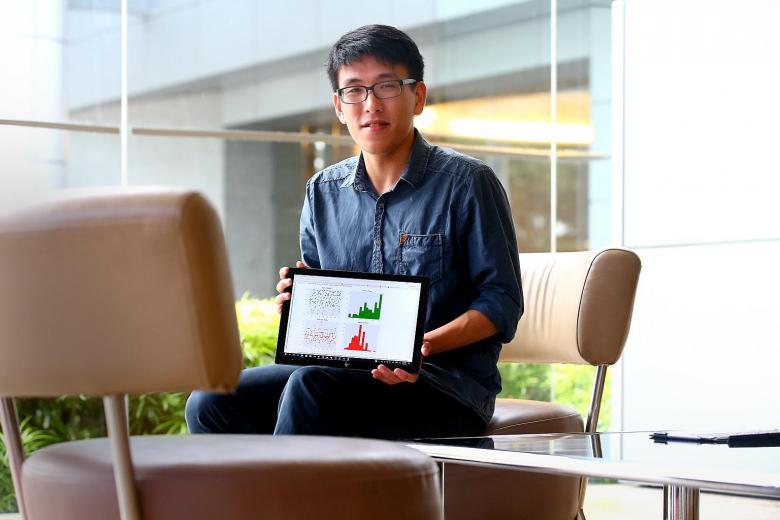SINGAPORE - A final-year National University of Singapore (NUS) law and economics student Mr Jerrold Soh, 26, has, together with three of his peers, created a simulator which can predict the division of assets in a divorce case.
"We started hearing lawyers saying that junior lawyers would be replaced by AI (artificial intelligence)," he told The Straits Times. "So I thought I better find out what it is and know how it works."
The four former schoolmates started a company, Lex Quanta, in September 2016, and each handled four main roles - data, coding, business and law.
The original prototype of their simulator took about half a year to create, and the final version should be ready by April. It predicts the outcome of cases by computing factors such as the total amount of assets involved and how each party contributed to the relationship, through an algorithm.
It has been tested on over 100 past cases involving the division of matrimonial assets - the combined property from a marriage, such as the house, the joint bank accounts and the family car.
In developing the simulator, Lex Quanta also tested it with over 10 family law firms.
Ms Susan Tay, 52, founding partner at OTP Law Corporation which was one of the firms, called it "exciting" and "promising".
She said she was happy that local law undergraduates were working on something like this for family law.
"I hope they will devote the resources to do this and carry it to the end."
Lex Quanta aims to extend the simulator's capabilities to other cases like those involving personal injuries such as traffic accidents, commercial cases such as contract disputes and intellectual property disputes, and other family law matters such as wills and letters of administration.
Mr Soh added that they hope the simulator would bring legal services to more people.
"If as a member of public, you use a simplified version of the simulator, you can get a rough sense of your problem and see if you should get a lawyer."
Mr Soh dismissed all notion of a "Frankenstein scenario" in which he ends up losing his job.
"I'm not afraid of it at all. It's nowhere near that kind of Terminator or Robocop scenario," he said.
He pointed out that AI lacked the human touch.
"It (the program) doesn't consider emotional factors unless you programme it to. But I think that's very difficult to do," said Mr Soh when explaining that it was tough for AI to decide who gets custody of the children.
"If you're saying 'I'm going to let this machine decide divorces on its own without any human involvement', then I'd be hesitant. But if we can use this algorithm to assist the human to make the final human judgement, then I don't see any problem with it."
Ms Tay of OTP Law Corporation added that family law practice was a very sensitive area.
"It's not just something you want to completely leave to a machine to deal with. When it comes to being heartbroken when your child is alienated from you, or when your marriage has broken down... I don't see how that can be replaced by technology any time soon."
A Hwa Chong Junior College graduate, Mr Soh does not stay on campus, and splits his time in university between the Faculty of Arts and Social Science at Kent Ridge, and the Faculty of Law at Bukit Timah.
He first got into coding in the army, as he wanted to do something fun with his time.
He said that balancing his roles in the company and his schoolwork required a lot of focus and efficiency.
"Whatever time I'm not spending in school, I'm spending on this."
There was also relevance between what he learned in school and in his line of work, said Mr Soh, describing them as "complementary."
Lex Quanta will operate out of a co-working space called Collision 8, at the High Street Centre opposite the Supreme Court, as part of the Future Law Innovation Programme (Flip), bringing them within close proximity with others in the legal field. This will help them share expertise, and get opinions on new ideas quickly.In response to queries from The Straits Times, a Law Society spokesman said: "The Law Society is strongly supportive of innovation and adoption of technology by our law firms to be more time-efficient, cost effective and competitive."
The society was set up in 1967 and maintains the standards of conduct and learning of the legal fraternity in Singapore , according to its website. Every Singapore lawyer, who has a practising certificate, is automatically a member.
The spokesman added that the society is aware of Lex Quanta, and that "we are open to initiating conversation with them as well as other legal start-ups to expand our menu of technology product offerings to further enhance our members' practices".


